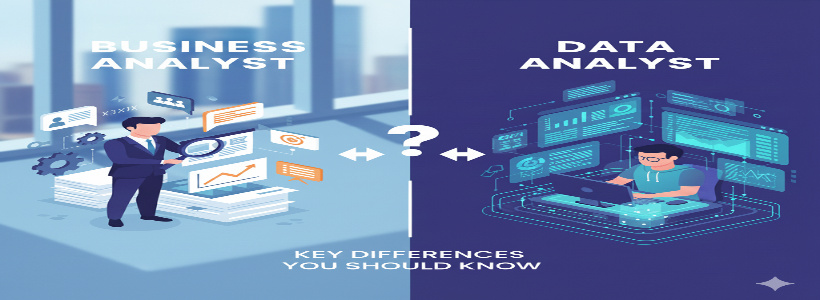
The Business Analyst (BA) and the Data Analyst (DA) are two positions that have become extremely popular in the contemporary data-driven business environment. Both play a crucial role in assisting companies to make effective decisions, automate processes and deliver quantifiable results. Nevertheless, they might share some goals, but their daily tasks, and competencies are very different, as well as their tools.
When you are considering a career in analytics or business strategy, you need to know how these two are complementary, but distinctly different. We shall discuss their individual functions, skills, and how you can take the correct course of your career.
1.Understanding the Roles
The major responsibility of a Business Analyst is to determine business requirements, define requirements and also make certain that technology solutions are consistent with organizational objectives. They are the connection between stakeholders and technical teams to translate complicated needs into practical solutions.
Conversely, Data Analyst will collect, clean, analyze and interpret the information. They aim to find patterns, trends and insights on which business decisions can be based. They are more about data visualization, data storytelling, and statistical analysis.
2. Key Responsibilities
Business Analyst Job description.
· Knowledge on business aims and agony.
· As a stakeholder, it involves holding stakeholder meetings and requirement workshops.
· Writing Business Requirement Documents (BRDs) and Functional Specifications.
· Working together with IT departments to execute solutions.
· Having new systems or features tested and validated.
Responsibilities of Data Analyst.
· Collecting and processing big data.
· Conducting statistical and trend analysis.
· Constructing dashboards and reports in such software as Power BI or tableau.
· Introducing knowledge to decision-makers.
· Favoring forecasting and data-driven predictions.
The Business Analyst is more interested in the why and how of business changes, whereas the Data Analyst is more interested in the what obtained by means of data.
3. Skills: Business vs Data Analyst.
Business Analysts should possess excellent communication skills, critical thinking and problem solving skills. They need to have knowledge of business operations and elementary IT knowledge. They are used to work with such tools as Jira, Confluence, MS Visio, and Excel.
Instead, Data Analysts should be at home with numbers and programs. They operate with SQL, Python, R and data visualization solutions such as Tableau and Power BI. Good command of statistics and Analysis is essential in this position.
In case you like to work with people, processes, and translate the needs into action Business Analysis is a good fit.
In case you are data oriented, like to discover the insights of a dataset, and like to work with analytical tools, Data Analysis may be your vocation.
4. Career Path and Opportunities.
Business Analysts and Data Analysts are in high demand in the world. Analytics is helping organizations make smarter decisions and having competent professionals in either position are important assets.
The roles that a Business Analyst can advance into include:

· Senior Business Analyst
· Product Owner
· Project Manager
· Business Consultant
In the meantime, a Data Analyst may transfer to the following roles:
· Data Scientist
· Business Intelligence (BI) Analyst.
· Data Engineer
· Machine Learning Specialist.
The two career options have good growth opportunities, particularly in the digital transformation of industries.
5. Salary Comparison
The global employment market statistics show that on average, a Business Analyst will make between 70,000-110,000 a year depending on his experience and geographical location.
Data Analyst has an average salary of approximately $65,000105,000 with a potential of increasing much more when well skilled in data science.
The two jobs have good salaries and a chance to work in various sectors which include finance, medical, retail, and information technology.
6. The Education Career: To Get Started.
You do not need a technical degree in order to become a Business Analyst. Nonetheless, being certified and trained through a structured program can make you special. The courses oriented on the requirements collection, business process modeling, and agile approaches are necessary.
A Data Analyst, conversely, is more likely to require a firmer background in mathematics, statistics and programming. Power BI, SQL, or Python certifications are also likely to give a significant boost to your profile.
In case you are inclined to both the business strategy and analytics, then you can take one of the best business analytics courses online provided by the recognized IT training schools. The programs give practical exposure to real project, case studies, and tools of the leading companies.
7. The Question of Business Analyst vs. Data Analyst.
You should select your career path based on your interest in it and strength:
Do you like collaborating with the stakeholders, optimizing processes, and developing solutions? Go for Business Analysis.
horizons: You are obsessed with data visualization, coding, and discovering latent patterns? Choose Data Analysis.
Other practitioners even bundle the two sets of skills and become hybrid practitioners such as Data-Driven Business Analysts - practitioners who are capable of making sense of data insights and translating them into business-appropriate and actionable strategies.
Assuming you are willing to begin this process, you can take an online course in business analysis to develop a solid background in the areas of process analysis, documentation, and stakeholder communications.
8. Tools of the Trade
Business Analysts often use:
• Microsoft Excel
• Jira and Confluence
• Process modeling with MS Visio or Lucidchart.
• Agile and Scrum frameworks
Data Analysts rely on:
• SQL for querying data
• Python or R for analysis
• Tableau or power BI to visualize data.
• Excel for basic analytics
The two roles are becoming more and more dependent on automation and AI-based systems to enhance efficiency and accuracy.
9. Real-World Collaboration
Business Analysts and Data Analysts often work together in present-day organizations. For example:
• A Trend drop in sales is found by a Data Analyst.
• A Business Analyst plays the role of researching on the inefficiencies in underlying processes and offering solutions.
They combine to produce a data-driven plan that enhances the performance and decision-making.
To build these collaborative and technical skills, you should consider enrolling into an online business analyst course that focuses on real life situations, learning through projects and being mentored by professionals in the field.
10. The Future of Business and Data Analysis.
The distinction between Business Analysts and Data Analysts is fading with organizations requiring people that possess business skills and data literacy. The future of both jobs becomes bright with the emergence of AI, automation, and predictive analytics.
Business Analysts are becoming strategic enablers and digital transformation, whereas Data Analysts are becoming insight generators and using analytics to become innovative.
A mix of business and data analytics skills will put you at an advantage in case your goal is to future-proof your career. The learning platforms are currently providing you with flexible programs to enable you to master these skills at your convenience.
Educate yourself in a way that includes both business process training and analytical thinking in a ba analyst course online. Through such programs, you will be equipped to deal with business problems in the real world with the help of data-driven decision-making.
Conclusion:
Business Analysts, as well as Data Analysts, are of importance to the contemporary business. Unlike Business Analysts who are concerned with alignment of technology to business intentions, Data Analysts are concerned with transforming data to insights.
The question of whether or not to select these particular roles depends on your interests, i.e., whether you are more of a communicator and strategist or an analyst and interpreter of data.
The choice of the path to follow is always up to you but ensure that you invest in structured learning by taking the best business analytics courses online or a business analyst course online. These programs are not only beneficial to your skills but also to earn industry recognized certifications that are a gateway to the world.
When you take an online business analyst course or a ba analyst course online, you can be prepared to have a satisfying career that incorporates analytical thought, business intelligence, and innovation all of which are the key ingredients of success in the digital economy today.